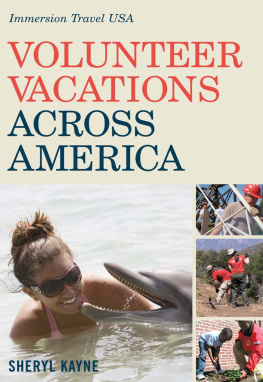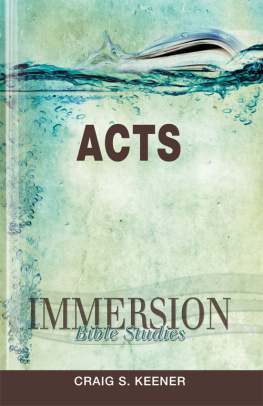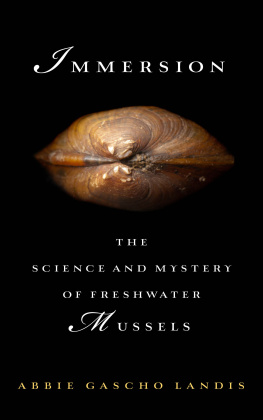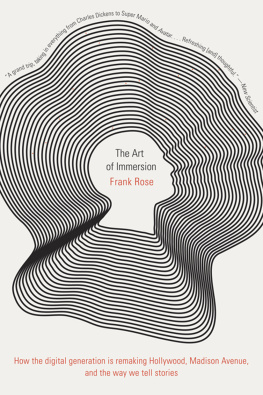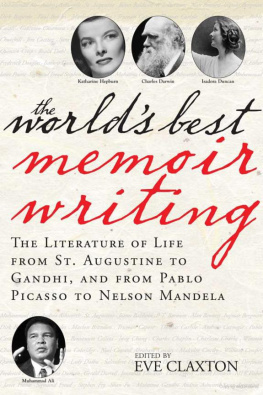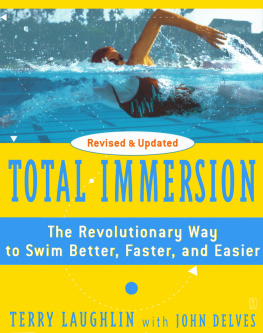Acknowledgments
Im grateful to the following for their wise counsel and their enthusiasm for this volume. Erika Stevens initially approached me to write this book. Im grateful to her for her enthusiasm for the idea and for nudging me to write it. Im also grateful to Regan Huff, to whom the baton was passed; Regan was equally enthusiastic and helped me through the editing process. Likewise, Id like to thank Dorine Jennette for her good catches, sharp insights, and enthusiasm for the book. Id also like to thank Nicole Mitchell at The University of Georgia Press, my colleague Bonnie Sunstein for her support and recommendations, my former classmate from the Iowa Writers Workshop, Eileen Pollack, for her expertise, Hattie Fletcher at the magazine Creative Nonfiction for her witty insights into the form, and Kate Lee at International Creative Management. Im grateful to the Virginia Center for the Creative Arts for giving me the space and time I needed to kick-start this project. Finally, Id like to express my gratitude to those busy writers who took time out of their schedules to answer the questions I put to them about their own experiences with immersion writing: Bob Cowser, Martin Goodman, Stephanie Elizondo Griest, Melissa Pritchard, Joe Mackall, and Dale Maharidge.
ALSO BY ROBIN HEMLEY
NONFICTION
Turning Life into Fiction
Nola: A Memoir of Faith, Art, and Madness
Invented Eden: The Elusive, Disputed History of the Tasaday
Do-Over! In Which a Forty-eight-year-old Father
of Three Returns to Kindergarten, Summer Camp,
the Prom, and Other Embarrassments
FICTION
All You Can Eat (Stories)
The Last Studebaker (a Novel)
The Big Ear (Stories)
Reply All (Stories)
EDITED VOLUMES
Extreme Fiction: Fabulists and Formalists
(with Michael Martone)
Chapter One
Immersion Memoir
The first question we have to ask is this: arent all memoirs immersions? Isnt that one of the criticisms of them? The answer is simple. I dont mean immersion in the sense of yet deeper self-involvement. On the contrary, the immersion memoirist takes on some outward task or journey in order to put his/her life in perspective. As I mentioned in the introduction, the difference between immersion journalism and immersion memoir is that an immersion journalist is primarily interested in reporting on the world outside herself while using the self as the vehicle for that information. The opposite is true of the immersion memoir. The immersion memoirist is interested in self-revelation or evaluation while using the outside world as his/her vehicle.
The immersion memoirist is interested primarily in understanding the Self, that tricky and elusive notion, and not so small a task. As Emerson wrote, To believe your own thought, to believe what is true for you in your private heart is true for all menthat is genius. Speak your latent conviction, and it shall be the universal sense (Self-Reliance). To write honestly about the Self more often takes courage and generosity than egoism.
When I was an undergraduate in college, I majored for a while in anthropology. At that time, many anthropologists still pretended they were dispassionate observers of other culturesat least the idea of relativism hadnt quite trickled down to my classroom yet. The case of early ethnographer Frank Cushing was handed to me and my classmates as a cautionary tale, an example of an ethnographer losing his objectivity and going native, for which he was roundly criticized in his own time, the Victorian era.
What made Cushing so unusual was that he not only lived with and observed the Zuni tribe of New Mexico for five years, but he became a Zuni, integrating so well into their culture that he learned the language, the customs, was adopted by the pueblo, and was even initiated into the priesthood. From a contemporary view, at least from my point of view, his experiences were nothing short of amazing. What a privilege, what an extraordinary insiders view. But imagine what strength of character this man must have had to seek such experiences at a time when when Native American cultures were largely derided as savage, misunderstood, and at best exoticized. Widely dismissed by the anthropological establishment until at the least the late 1980s as an oddball, as one text refers to him, its hard now to find a single criticism of his participatory style of ethnography, which is considered ground breaking and ahead of its time. Certainly, Cushing was not the first to live with a tribe, but he was the first to live so intimately with a culture different from his own in a way that valued their customs and beliefs as much as his own, if not more so, and to communicate his insights to a wider audience. Perhaps one reason the establishment considered him such an oddball was that he was so public about his appreciation of the Zuni culture. He became something of a celebrity when in 1882, his accounts of living among the Zuni were featured in three of the most fashionable magazines of the time: The Atlantic Monthly, Harpers, and Century Illustrated Monthly Magazine, as well as Popular Science. Illustrations showed a ritually scarred Frank Cushing dressed in Zuni ceremonial garb being inducted into the Priest-hood of the Bow, and his accounts of life with the Zuni were anything but academic or weighted with the pretense of objectivity. In fact, his accounts in My Adventures in Zuni are loaded with charm as he describes his sense of culture shock when he first made the decision to live among the Zuni, thinking his white traveling companions would leave him with sufficient provisions for two months. To his dismay, they left him with nothing. When one of Cushings Zuni hosts notices his sadness at his friends departure, he asks why his little brother is sad.
Alas, I replied. My friends are all gone, and they have left me nothing.
He looked at me a moment and said, Little Brother, you may be a Washington man, but it seems you are very poor. Now, if you do as we tell you and will only make up your mind to be a Zuni, you shall be rich, for you shall have fathers and mothers, sisters and brothers, and the best food in the world. But if you do not do as we tell you, you will be very, very, very poor indeed.
Why should I not be a Zuni? I replied in despair; and the old man quickly answered, Why not?
Leaving me for a few minutes, he soon returned with a steaming bowl of boiled mutton, followed by his kindly old wife, bearing a tray of corn-cakes mixed with chili and sliced beef, which, wrapped in husks, had been boiled like meat dumplings.
There, try that, said the old man, as he placed the bowl in the center of the floor. Fill your stomach, and your face will brighten.
And the old woman stood admiringly by as I heartily ate my first genuine Zuni meal. (43)
Here clearly is a story, the beginning of a great adventure. No wonder he was excoriated by academics. He didnt wash all the personality out of his prose in an attempt to appear objective. He knew how to tell a story. He wasnt afraid of being a part of the story he wanted to tell. While certainly the book was as much about the Zuni as himself, at the center of it was his personal transformation, and that in part is what made it so engrossing to audiences of the time and so anathema to academics, who perhaps considered themselves above transformation, at least in print.
Without a doubt, the book that was most enjoyable for me to write and most satisfying in many regards was my own immersion memoir, Do-Over! In Which a Forty-eight-year-old Father of Three Returns to Kindergarten, Summer Camp, the Prom, and Other Embarrassments. Ive also written traditional journalism and a traditional memoir, but the confluence of these forms in the immersion memoir allowed me to satisfy both aspects of my personality, the pensive soul with a reflective bent, and the equally strong part of me that loves to travel, to meet people, to experience the world. For me, the immersion memoir combines the best that traditional memoir has to offer with the best of journalism. While immersion memoirs certainly have their critics, they also have plenty of fans.


